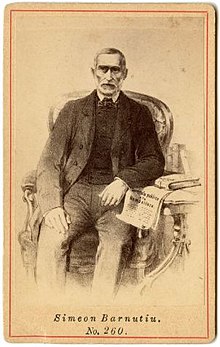Simeon Bărnuţiu
| Simion Bărnuțiu | |
|---|---|
 |
|
| Born |
July 21, 1808 Bocșa Română, Crasna County (now Sălaj County), Romania |
| Died | May 28, 1864 (aged 55) Fântâna Gorgana, Sânmihaiu Almașului, Sălaj County, Romania |
| Cause of death | Neuro-cardiac disease |
| Resting place |
Saint Mary Church in Bocșa 47°17′56″N 22°55′10″E / 47.29889°N 22.91944°E |
| Nationality | Romanian |
| Education |
List
|
| Alma mater | University of Pavia (June 6, 1854) |
| Occupation | Historian, philosopher, jurist |
| Known for | Transylvanian Revolution of 1848 |
| Parent(s) | Ioan Bărnuțiu (father) Ana Oros (mother) |
| Relatives |
Ioan Maniu (grandfather) Iuliu Maniu (great-grandfather) |
Simion Bărnuțiu (Romanian pronunciation: [simiˈon bərˈnut͡sju]; 21 July 1808 – 28 May 1864) was a Transylvanian, later Romanian historian, academic, philosopher, jurist, and liberal politician. A leader of the 1848 revolutionary movement of Transylvanian Romanians, he represented its Eastern Rite Catholic wing. Bărnuțiu lived for a large part of his life in Moldavia, and was for long a professor of philosophy at Academia Mihăileană and at the University of Iași.
Born in Bocșa (Hungarian: Oláhbaksa), Szilágy County, Transylvania. He became a teacher of history at the secondary school in Blaj, which was at the time, like the rest of Transylvania, part of the Austrian Empire. Bărnuțiu was influenced early-on by the philosophy of Immanuel Kant (Kantianism), in which he saw the means to reform society in opposition to traditional theological views, while supporting a presence of laity in the administrative structures of his own church. An active contributor to Foaie pentru minte, inimă și literatură, the literary supplement of George Barițiu's journal Gazeta de Transilvania, he became noted after 1842 for virulently opposing the decision of the Magyar-dominated Transylvanian Diet to give Hungarian a status of a semi-official language in local administration of Transylvania(see History of Transylvania).
...
Wikipedia
